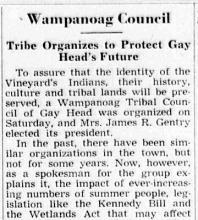Wampanoag Tribe of Gay Head
2003
The Aquinnah selectmen heard a distinct plea from their up-Island
neighbors this week to formally appeal the recent superior court
decision that found the Wampanoag Tribe of Gay Head (Aquinnah) cannot be
sued because of sovereign immunity.
Aquinnah Case in Towns' Eye
Up-Island Selectmen Will Meet; Neighbors Support an Appeal of Ruling
That Favored Tribe on Zoning
By JULIA WELLS
Gazette Senior Writer
The town of Aquinnah will join the Gay Head Taxpayers Association in
asking a superior court judge for reconsideration of his recent decision
in favor of the Wampanoag Tribe of Gay Head (Aquinnah).
Although the Aquinnah selectmen have agreed to join the move to
reconsider, they have not yet decided whether to take the next step and
appeal.
In a land-use decision that has potentially far-reaching
implications for every town on the Vineyard, a superior court judge
ruled last week that the Wampanoag Tribe of Gay Head (Aquinnah) cannot
be sued because of sovereign immunity.
If allowed to stand, the ruling by the Hon. Richard F. Connon has
the power to turn a landmark 1983 Indian land claims settlement on its
head.
A shed and a pier in the tiny town of Aquinnah were the fulcrum for court arguments this week that will ultimately test the question of whether the Wampanoag Tribe of Gay Head (Aquinnah) waived sovereign immunity when it signed a land claims settlement agreement in 1983.
The settlement agreement later led to federal recognition for the tribe.
Town and Tribe Collide in Court
Case Set for Wednesday Hearing Has Far-Reaching Implications;
Outcome Hinges on Issue of Tribal Sovereignty
By JULIA WELLS
Gazette Senior Writer
2002
A special superior court sitting is now set for next month in
Edgartown on a case that will ultimately decide whether the Wampanoag
Tribe of Gay Head (Aquinnah) has the power to police itself when it
comes to local zoning rules. The case will also decide the much larger
issue of whether the tribe cannot be sued because of sovereign immunity.
The case has attracted little attention, despite the fact that the
outcome could have far-reaching implications for every town on the
Vineyard.

